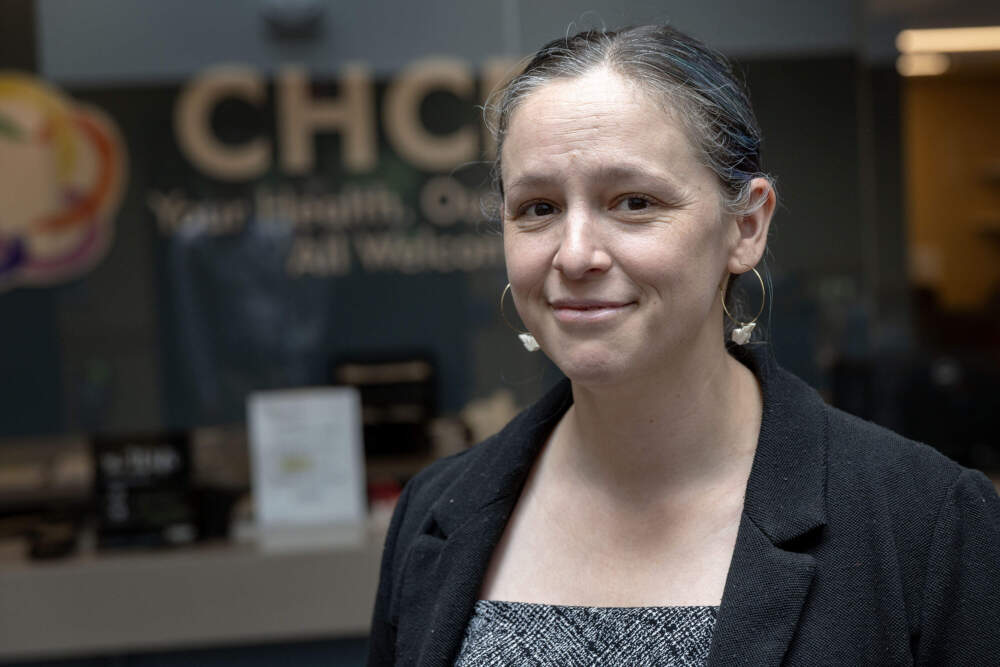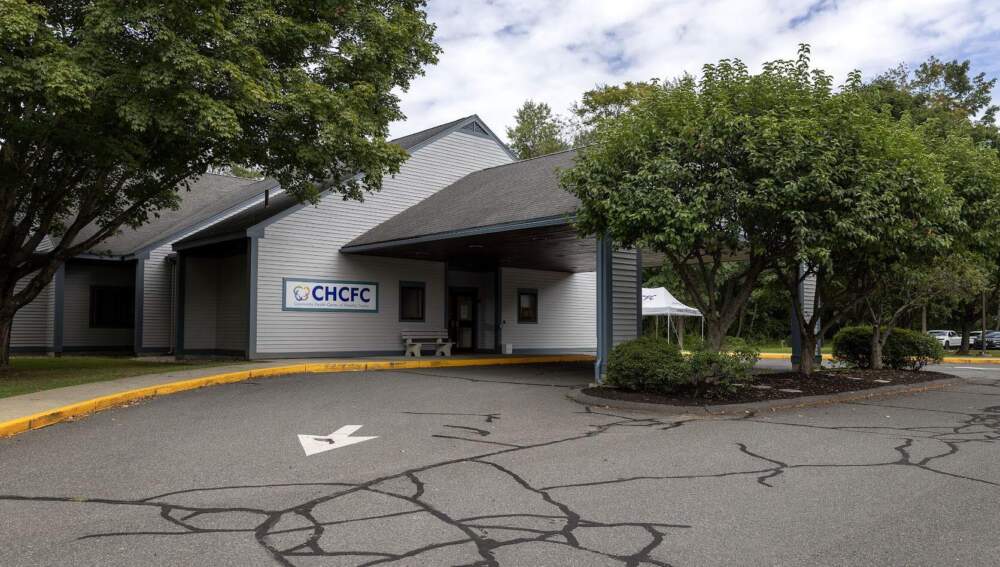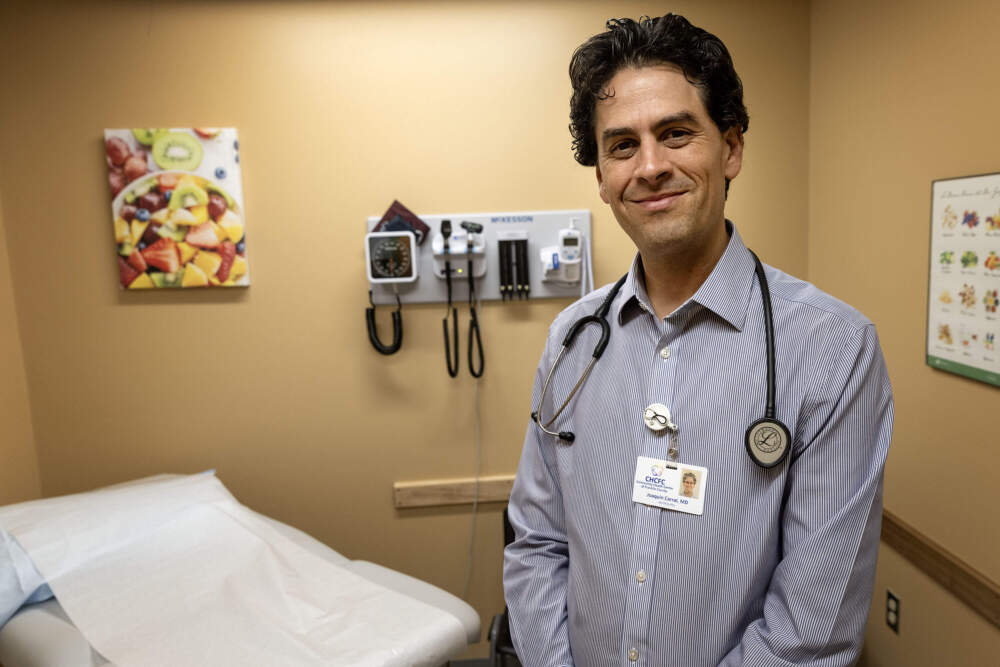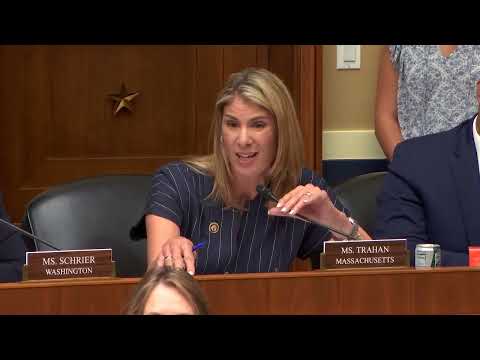Hundreds of thousands of low-income Massachusetts residents could lose Medicaid coverage over the next 10 years — a result of the massive tax and spending bill President Trump signed in July. The ripple effects are expected to hit hard, particularly in poorer and rural parts of the state.
Allison van der Velden, chief executive of the Community Health Center of Franklin County, is girding for the worst. The western Massachusetts nonprofit, with clinics in Greenfield and Orange, recently opened a third location in a sunlight-drenched building in Turners Falls. But given the new budget reality in Washington, van der Velden is worried about dark clouds ahead.
“The number of uninsured patients that we serve will increase,” van der Velden said. “We’re expecting to see sicker patients with less money to pay for their care.”
 Allison van der Velden, DMD, has served as CEO of the Community Health Center DMD served as Chief Executive Officer since August 2020. (Robin Lubbock/WBUR)
Allison van der Velden, DMD, has served as CEO of the Community Health Center DMD served as Chief Executive Officer since August 2020. (Robin Lubbock/WBUR)
Earlier this summer, doctors and nurses at the Turners Falls clinic took a break outside for ice cream, served from a bright red truck under a sign that carried a lighthearted message: “Saving lives one scoop at a time.”
“Our staff works so hard to take care of our community — and they deserve ice cream,” van der Velden said.
But her staff’s work could take a hit in the coming years. Trump’s so-called Big Beautiful Bill will deliver $4.5 trillion in tax cuts nationally. To help pay for that, it cuts about a trillion dollars from Medicaid, mostly through new work and eligibility requirements. According to the Center on Budget and Policy Priorities, a liberal think tank based in Washington, as many as 350,000 Massachusetts residents could lose health coverage.
That would take a harsh toll on rural community health centers like the clinics in Franklin County, which welcome all comers, regardless of ability to pay. Van der Velden said more than 40% of their patients depend on Medicaid.
 The Community Health Center of Franklin County’s clinic at 8 Burnham Street, Turners Falls, Mass. (Robin Lubbock/WBUR)
The Community Health Center of Franklin County’s clinic at 8 Burnham Street, Turners Falls, Mass. (Robin Lubbock/WBUR)
“When folks are uninsured, they still show up for care and there is no reimbursement,” van der Velden said.
That means fewer dollars available to cover a population in need of care, she said.
“I’m very worried,” said Joaquin Carral, a primary care doctor at the Turners Falls clinic.
Many of Carral’s patients are low-income and include immigrants and farmworkers who depend on Medicaid. He said the new work requirement, along with a demand that patients file forms twice a year proving they still qualify for assistance, will be a challenge for people who might not speak English well or be computer savvy.
“That will be definitely a barrier,” Carral said, adding that many people could lose access to care when they need it the most. He said Medicaid helps pay for preventative care that can be life-saving in some cases. For example, the clinic can provide routine pap smears to women at low or no cost.
“We can give her that opportunity to be screened for preventable cancer that could be lethal,” he said.
 Joaquin Carral, a primary care doctor with the Community Health Center of Franklin Country, at the Turners Falls facility. (Anthony Brooks/WBUR)
Joaquin Carral, a primary care doctor with the Community Health Center of Franklin Country, at the Turners Falls facility. (Anthony Brooks/WBUR)
Republicans have argued the new budget law controls run-away Medicaid costs by targeting “waste, fraud and abuse.” But the nonpartisan Congressional Budget Office estimates it will result in 10 million Americans losing health care coverage.
After the law was passed, Rep. Brett Guthrie of Kentucky said, “The people who lose Medicaid were either ineligible, illegal or able,” meaning able-bodied. He argued that the new rules protect “the most vulnerable” people, by requiring Medicaid recipients to work.
Democrats call the argument a cynical excuse to pay for tax cuts primarily for the wealthy.
“Your budget slashes Medicaid, which covers over 40% of kids,” said Rep. Lori Trahan of Massachusetts, during a heated exchange with Secretary of Health and Human Services Robert F. Kennedy Jr. before the law passed.
Kennedy falsely asserted that there were no cuts to Medicaid.
“Here’s the truth: people are going to die,” Trahan said in response. “These hospitals are going to close.”
 Load YouTube video
Load YouTube video
The Medicaid cuts represent a major setback for Massachusetts, which has come close to providing health care coverage to all of its citizens. Thanks in part to Medicaid expansion under Obamacare, 98% of the state’s residents have health insurance. That accomplishment is now in jeopardy.
According to studies, Massachusetts could lose between $2 billion and $3.5 billion a year in federal Medicaid spending — a major blow to a state budget already under considerable strain.
“This is devastating,” said Michael Curry, chief executive of the Massachusetts League of Community Health Centers. He said the cuts will hurt patients, while also damaging community health care centers like the one in Franklin County.
Curry said the most cost-effective approach to health care is to “keep people healthy” and keep them out of high-cost emergency rooms.
“Medicaid allows us to do that,” he said.
